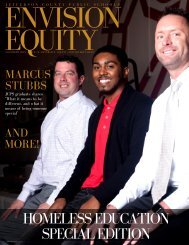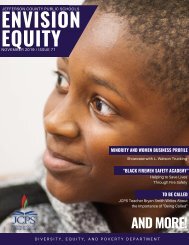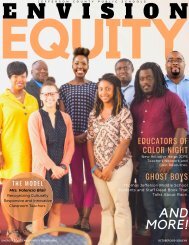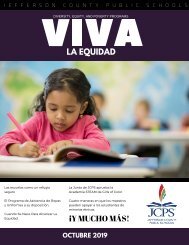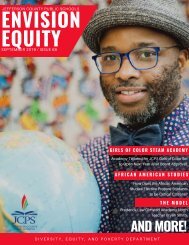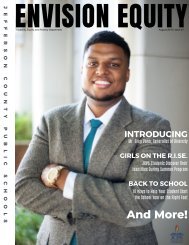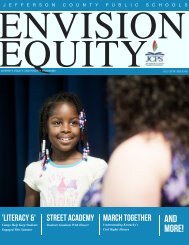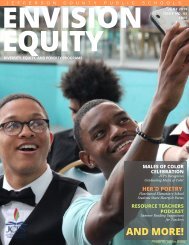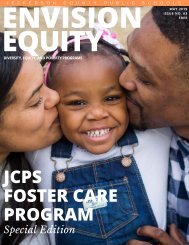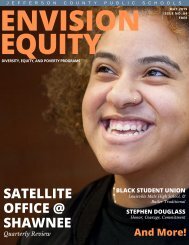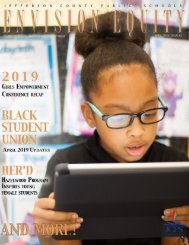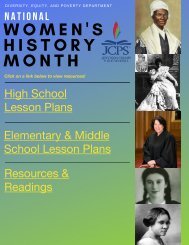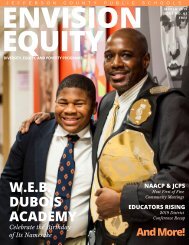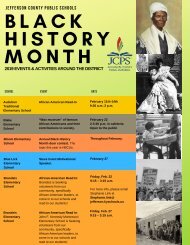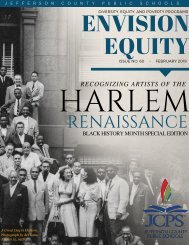November 2017 Edition
Readers, Please enjoy the November 2017 edition of our Envision Equity newsletter. Remember that Envision Equity is also your newsletter. We hope that you will submit articles that celebrate and demonstrate diversity and inclusion. As a reader, you will have access to photos from events that embody the purpose of this newsletter. Please feel free to peruse our Flickr account, which is posted under the cover page.
Readers,
Please enjoy the November 2017 edition of our Envision Equity newsletter. Remember that Envision Equity is also your newsletter. We hope that you will submit articles that celebrate and demonstrate diversity and inclusion. As a reader, you will have access to photos from events that embody the purpose of this newsletter. Please feel free to peruse our Flickr account, which is posted under the cover page.
Create successful ePaper yourself
Turn your PDF publications into a flip-book with our unique Google optimized e-Paper software.
1<br />
Photo, Getty Images
Above, JCPS teachers hold a discussion during<br />
the <strong>2017</strong> Fall Equity Institute.<br />
<strong>2017</strong><br />
Fall Equity Institute Recap<br />
By Charles Davis—Coordinator, Diversity, Equity, and<br />
Poverty Programs<br />
o<br />
Photos, Kennedy Marshall<br />
n Monday October 9th, <strong>2017</strong> more than<br />
400 educators from around JCPS attended<br />
the Fall Equity Institute. Held at Ramsey Middle<br />
School. The full-day session began with words<br />
from Acting Superintendent Dr. Marty Polio and<br />
Chief Equity Officer Dr. John Marshall to set the<br />
tone for the day. The morning plenary session<br />
was conducted by Dr. Charles Corprew. Dr.<br />
Corprew is a nationally recognized expert in the<br />
development of adolescents and emerging<br />
adults in diverse contexts, particularly African<br />
American males. Dr. Corprew’s message spoke to<br />
the need for equity within organizations, the five<br />
critical characteristics of equitable leaders and<br />
the need for commitment to developing<br />
individuals and leaders within organizations.<br />
After the plenary session, Charles C. Davis, Jr.,<br />
provided instructions to participants on how to<br />
2<br />
Continue on next page
ENVISION EQUITY NOVEMBER <strong>2017</strong><br />
proceed throughout the day. The Fall Equity<br />
Institute offered a series of breakout sessions<br />
that provided those in attendance with<br />
strategies to engage with a diverse population<br />
of students that they may engage with daily.<br />
Sessions included:<br />
•Emotional intelligence in boys;<br />
•Storytelling in the classroom;<br />
•Creating culturally inclusive classroom<br />
communities;<br />
•Engaging families as a strategy for student<br />
success;<br />
•Empowering African-American males in the<br />
classroom through C.A.R.E. (Conversations,<br />
Authentic Relationships, Role Models and<br />
showing Empathy);<br />
•Strategies to increase English language<br />
learner student outcomes; and<br />
•Using music, dance and visual arts to impact<br />
curriculum.<br />
At the Equity Institute’s closing sessions,<br />
participants had the opportunity to<br />
participate in a multi-media experience<br />
entitled Power to the Peaceful. Conducted by<br />
artist and JCPS graduate Jecorey Arthur,<br />
attendees had the opportunity to sing, dance<br />
and shout along with performers as they<br />
engaged with topics ranging from bullying to<br />
self-esteem to creating safe and positive<br />
environments for youth in both schools and<br />
communities.<br />
The Office of Diversity, Equity and Poverty<br />
Programs Equity and Inclusion Unit would like<br />
to thank all<br />
participants<br />
who<br />
attended<br />
the Fall<br />
Equity<br />
Institute.<br />
We would<br />
also like to<br />
thank the presenters who created spaces for<br />
attendees to think about ways to shape their<br />
pedagogies to reach all students. And finally,<br />
we would like to thank Principal Darryl<br />
Farmer and the faculty and staff of Ramsey<br />
Middle School for once again being such<br />
gracious hosts. It is our goal to continue to<br />
support JCPS in its mission to provide<br />
resources to all students and staff to<br />
participate in Deeper Learning, as at the very<br />
core of Deeper Learning you will find equity.<br />
3
ENVISION EQUITY NOVEMBER <strong>2017</strong><br />
School Based Decision Making Council<br />
Parent Member: Marian R. Vasser<br />
By Marian R. Vasser<br />
My name is Marian R. Vasser and I<br />
currently serve as the Director of<br />
Diversity Education and Inclusive<br />
Excellence at the University of Louisville, where I<br />
have been employed for over 24 years. My<br />
personal and professional passions include<br />
working to build climates that are more inclusive<br />
and equitable for all. In addition to being engaged<br />
in this critical work at UofL and throughout the<br />
community, I also get to blend it with another<br />
Photos, Abdul Sharif<br />
passion of mine, which is being a mom. I am the<br />
proud mother of three talented, intelligent, and<br />
handsome young men. My oldest son (Trey), who<br />
was also a JCPS student, is now 23 and working at<br />
General Electric. My 14 year-old twins (Tavon and<br />
Tobias) are currently 8 th graders at Noe Middle<br />
School. I am very active in my children’s<br />
education and try to serve in ways that not only<br />
increase their chances of success, but the success<br />
other children as well.<br />
4
ENVISION EQUITY NOVEMBER <strong>2017</strong><br />
When my oldest son was in school, I had several unpleasant experiences as a result of inequitable<br />
practices. I recall being very frustrated far too often and deciding something had to change. Many of the<br />
teachers I encountered were simply following policies and procedures, while totally unaware of how<br />
certain students (including my son) were being ushered directly into the school-to prison pipeline as a<br />
result. The more engaged I became, the more I learned about policies and procedures that needed to<br />
change. At that time, my schedule was less flexible and I was only able to show up at the school<br />
periodically. Although my son graduated on time, I was extremely frustrated by this experience and now<br />
concerned that I had twins entering the same system. My oldest son had a really rough time navigating<br />
his educational experience. Fortunately, my twins had a better experience for several reasons. They<br />
became more focused and I was able to commit more time to getting involved in their school. It made a<br />
world of difference, let me tell you. In addition to being active in PTA, even serving as president several<br />
years, I also became a member of the School Based Decision Making Council (SBDM).<br />
The SBDM Council is responsible for setting school policy (consistent with Jefferson County Board of<br />
Education [JCBE] policy) that will provide an environment to enhance student achievement and to help<br />
students meet established academic goals. The SBDM Council has authority in the following areas:<br />
• Determination of curriculum, including needs assessment, curriculum development, and<br />
responsibilities under KRS 158.6453(19);<br />
• Assignment of all instructional and noninstructional staff time;<br />
• Assignment of students to classes and programs within the school;<br />
• Determination of the schedule of the school day and week, subject to the beginning and ending<br />
times of the school day and school calendar year as established by the local board;<br />
• Determination of use of school space during the school day related to improving classroom<br />
teaching and learning;<br />
• Planning and resolution of issues regarding instructional practices;<br />
• Selection and implementation of discipline and classroom management techniques as a part of a<br />
comprehensive school safety plan, including responsibilities of the student, parent, teacher,<br />
counselor, and principal;<br />
• Selection of extracurricular programs and determination of policies relating to student<br />
participation based on academic qualifications and attendance requirements, program<br />
evaluations, and supuervision;<br />
• Adoption of an emergency plan as required in KRS 158.162;<br />
• Procedures, consistent with local school board policy, for determining alignment with state<br />
standards, technology utilization, and program appraisal;<br />
• Procedures to assist the council with consultation in the selection of personnel by the principal,<br />
including but not limited to meetings, timelines, interviews, review of written application, and<br />
review of references.<br />
The law requires membership of the SBDM Council to include PARENTS, teachers, and the principal of the<br />
school. Getting involved, as a parent, means YOU are empowered to contribute to the decision-making<br />
process that directly affects the learning environment. I remember the first year I served on the council, it<br />
Continue on next page
ENVISION EQUITY NOVEMBER <strong>2017</strong><br />
was a bit intimidating as I did not know much about school<br />
budgets, policies, or procedures. The first year, I sat back and tried<br />
to learn as much as I could. I remember feeling like it was a waste<br />
of my time originally because it felt as though I was as an outsider<br />
looking in. Once I began to build relationships with other parents<br />
on the council, I realized it was our duty to speak up. It was not<br />
long before I was consistent in asking questions and even<br />
challenging policies and practices that seemed inequitable. One of<br />
the things I constantly reminded myself of was the fact that my<br />
position on the council came with privilege. Many SBDM parents<br />
likely have more flexible schedules than some of the parents that<br />
need policies changed the most. With that in mind, I made it a<br />
point to become more involved and ask questions until I<br />
understood fully, even if it meant utilizing the full time allotted to<br />
the meeting. During this process, I also learned more about the<br />
role of the teachers and administrators. Although some of the<br />
revelations were heartbreaking, in terms of how much agency<br />
teachers lacked, I felt empowered that my contribution could affect<br />
change positively for children and teachers. As a parent, we do have<br />
a say and we should most definitely exercise that right.<br />
I have served as an SBDM council member for approximately 6 years now and I am proud to say I have<br />
contributed to many positive changes at the school where I served. In addition to revising dress codes to<br />
be more inclusive, I have even witnessed positive changes in leadership as a result of the SBDM. My<br />
favorite poet, Maya Angelou, says “Nothing will work, unless you do.” I encourage those of you who have<br />
schedules permitting to please get involved. The more involved we are, the better JCPS can be. There are<br />
many ways to be involved, so if your schedule doesn’t permit you to serve on SBDM, stay in touch with<br />
your SBDM reps so your voice can be heard. Hold us accountable! I realize as an SBDM parent-rep, I am<br />
not there only for my children, I am there representing those voices that often go unheard or<br />
unconsidered. The SBDM is a perfect avenue for challenging policies that perpetuate inequitable<br />
disciplinary actions, lack gender equity, widen educational achievement gaps, etc. While I realize the lack<br />
of diversity on most SBDM councils are the result of inflexible schedules, I strongly encourage parents who<br />
are minorities to consider serving.<br />
My twins are blessed to be at a wonderful school that values parent involvement, although I know this can<br />
be a challenge in other environments. When I have ever felt a level of discomfort, I have always received<br />
valuable feedback and advice from Dr. Shawna Stenton, who is responsible for SBDM councils throughout<br />
JCPS. Shawna is extremely knowledgeable and approachable and has played a major role in the success<br />
of my tenure as an SBDM parent-rep. The experience, for me, has been extremely rewarding and I am<br />
willing to personally mentor any parent wanting to be involved in this capacity.
ENVISION EQUITY NOVEMBER <strong>2017</strong><br />
W.E.B.<br />
DuBois<br />
Academy Crest and Logo<br />
By Robert Gunn—Principal W.E.B. DuBois Academy<br />
T<br />
he Crest for the W.E.B. DuBois Academy<br />
was designed to symbolize core tenets of<br />
our school. The book serves as an icon<br />
for scholarship and we believe each young man<br />
we serve will grow academically.<br />
The graduation cap signifies our belief each<br />
young man will graduate high school with the<br />
skills, opportunity, and choice to continue his<br />
education in college or embark upon a career<br />
path of his choosing.<br />
The shaking hands signify our belief in<br />
community and brotherhood. Finally, the lion<br />
wearing a crown is our primary brand which<br />
signifies our belief that each young man we<br />
serve was born to achieve greatness. Lions<br />
signify strength and leadership. The W.E.B.<br />
DuBois Academy is where young lions are<br />
developed into kings and future leaders.<br />
The W.E.B. DuBois Academy Creed:<br />
I was born to achieve greatness.<br />
I will not be defined by my mistakes, but, my willingness to accept correction to learn and grow.<br />
My greatness, will be a result of my work ethic, mentorship, and support.<br />
I will achieve all of my goals.<br />
I will be accountable for my actions and responsible to positively impact my community.<br />
I was born to achieve greatness, and I will determine the man I will become.<br />
One PRIDE.<br />
One BROTHERHOOD.<br />
7
A Step<br />
Forward<br />
For Students and Families<br />
By Justin Willis—Parent Relations<br />
Specialist, Diversity, Equity, and Poverty<br />
A<br />
fine print item approved at the October 24<br />
meeting of the Jefferson County Board of<br />
Education (JCBE) will bring big changes to<br />
students throughout the school district.<br />
The item is an agreement between the 15th District<br />
Parent Teacher Association (PTA) and a New York<br />
shoe company, National Fashions Imports. For the<br />
first time in many years, the 15th District PTA—<br />
working with the Diversity, Equity, and Poverty<br />
(DEP) Programs and other JCPS partners—will help<br />
students in need to receive brand new athletic<br />
shoes.<br />
Many JCPS employees who work tirelessly to make<br />
sure students are provided with basic needs cite<br />
shoes as a chronic gap. While resources and<br />
systems are in place to help students with clothing<br />
needs, vision exams and glasses, food,<br />
transportation, backpacks and school supplies,<br />
there has not been a consistent and reliable<br />
resource for new shoes. Now, help will be a phone<br />
call away.<br />
A bulk purchase will be made in early <strong>November</strong>,<br />
and distribution of the shoes to JCPS students<br />
could begin in January. The shoes will be housed<br />
and distributed from the 15th District PTA’s<br />
Clothing Assistance Program (CAP). This will allow<br />
immediate service and accessibility. A JCPS<br />
employee could visit CAP to pick up shoes for a<br />
student or they could be sent to a JCPS employee<br />
through the Pony mail service. Students will also<br />
be able to visit CAP, have their feet measured, and<br />
leave with a pair of shoes.<br />
8<br />
Continue on next page
ENVISION EQUITY NOVEMBER <strong>2017</strong><br />
The process of supplying shoes to<br />
students in need will be finalized in the<br />
coming weeks, but the process will likely<br />
be similar to the existing way that<br />
someone makes an appointment to<br />
receive services at CAP. A Family Resource<br />
Youth Services Center (FRYSC) coordinator<br />
or other worker will contact CAP to<br />
express the need and share the student’s<br />
information.<br />
The running-style shoes are available in a<br />
variety of contemporary colors and styles.<br />
Samples were obtained last spring and<br />
featured at information tables that the<br />
15th District PTA hosted at schools and<br />
community events. The shoes are a<br />
conversation piece and several students<br />
and adults were interested in purchasing<br />
them. This was anecdotal information<br />
perhaps but confirmation that the shoe types and styles are popular with students.<br />
The push for shoes has been in the works for the past year. There is a trust fund used to purchase new<br />
uniforms, underwear, socks, and belts for JCPS students. Homeless Education coordinator Giselle<br />
Danger met with JCPS and other representatives to determine how much of the fund could be<br />
allocated to shoes. These discussions led to the funds being allocated to launch the shoe program.<br />
In March, the 15th District PTA approved the creation of a restricted fund that would allow the<br />
nonprofit to raise money for shoes. The fund, From the Ground Up! encourages people to donate,<br />
promising that for every $50 donated, at least four pairs of shoes would be provided to students. This<br />
fund, launched in tandem with the Mayor’s Give a Day Week of Service in mid-April, has since raised<br />
several thousand dollars, all of which will go directly to shoes.<br />
The district fund allows an initial purchase of as many as 4,000 pairs of shoes, and From the Ground<br />
Up! will allow the 15th District PTA to continue raising funds with the hopes of serving more students.<br />
The 15th District PTA’s vision is to offer each student in need a new uniform shirt and pants, five pairs<br />
each of socks and underwear, a belt, and a new pair of shoes. The addition of shoes truly supports<br />
clothing and basic needs for students—from the ground up.<br />
Additional work and community partnerships will be needed to offer shoes to all students who may<br />
need them. During the first 10 weeks of the <strong>2017</strong>-18 school year, 4,200 students have visited CAP to<br />
receive new uniforms.<br />
Continue on next page
ENVISION EQUITY NOVEMBER <strong>2017</strong><br />
The 15th District PTA will continue to promote From the Ground Up! as a worthy investment for any<br />
individual, group, business, or organization. To obtain a speaker or demonstration about From the<br />
Ground Up!, call (502) 485-7450.<br />
The addition of shoes as a resource is a step forward for JCPS students and families. The costs of raising<br />
children are a hardship and sacrifice for all families, especially in a school district where two of every<br />
three families are eligible for free and reduced-price meals. Beginning in January, the most vulnerable<br />
students—impoverished, homeless, refugees, and all those in homes where financial stability is<br />
threatened—will have one less distraction to their academic success and a new bounce to their step.<br />
Expanding Perspectives<br />
By Dr. Monica Lakhwani— Diversity, Equity, and Poverty<br />
Dr. Monica Lakhwani and Charles C. Davis, Jr<br />
with the delegation from Tajikistan (photo<br />
courtesy of Dr. Monica Lakhwani)<br />
Dr. Monica Lakhwani and Mr. Charles Davis<br />
had the honor of meeting members of<br />
the Ministry of Education and Science of<br />
Republic of Tajikistan. The group visited<br />
Louisville as part of a program of the Meridian<br />
International Center and World Affairs Council<br />
and they wanted to learn more about teacher<br />
training and how equity and inclusion are infused<br />
into JCPS.<br />
Mukhammadali Afgonov, head of the Department<br />
of Education in Dushanbe, said that finding<br />
school building/space and providing technology<br />
for all of their students is one of the challenges<br />
for their school systems.<br />
The Republic of Tajikistan student population<br />
includes Afghan and Russian minorities. Separate<br />
schools are provided for these populations with<br />
an emphasis in maintaining their native language<br />
and culture. In some mountainous regions, one<br />
classroom can consist of students from multiple<br />
grade levels. Dushanbe is the capital and largest<br />
city of Tajikistan with an overall population of<br />
over 800,000.
ENVISION EQUITY NOVEMBER <strong>2017</strong><br />
JCPS Race and Equity Policy<br />
By Krista Drescher—Burke, PhD, MSW<br />
J<br />
CPS is in the process of developing a Race<br />
and Equity policy. An auxiliary committee<br />
of community members has been invited to<br />
participate in the process. The auxiliary<br />
committee will develop a proposed policy draft,<br />
which will be sent to the Board policy group,<br />
which will in turn be proposed to the Board for a<br />
vote. October 11, <strong>2017</strong> marked the beginning of<br />
this process as the committee, consisting of<br />
community leaders representing Louisville Urban<br />
League, the Office for Safe and Healthy<br />
Neighborhoods, JCTA, University of Louisville,<br />
and others, met for the first time. With the final<br />
convening on January 8, 2018, the committee will<br />
meet five times to hear from topic experts, and be<br />
able to discuss with invited guests, as well as<br />
JCPS facilitators and other staff, how to address<br />
with policy the myriad challenges our students of<br />
color are experiencing disproportionately.<br />
are less likely to graduate, and much less likely to<br />
graduate college or career ready. One area that is<br />
often overlooked is the fact that many students<br />
of color report feeling less sense of belonging at<br />
their schools. The race and equity policy auxiliary<br />
committee is tasked to develop policy<br />
approaches to these challenges in our District.<br />
The tenets the auxiliary committee is asked to<br />
address include the following:<br />
• Diversity in curriculum,<br />
• Cultural competency training for staff,<br />
• Staffing diversity,<br />
• Programmatic access,<br />
• School culture and climate, and<br />
• Central office departmental resolution and<br />
commitment to racial equity.<br />
The first meeting was held at the California<br />
Community Center, which is partnering the with<br />
Diversity, Equity, and Poverty department to<br />
establish a satellite office for JCPS. The<br />
community was invited to attend, which yielded<br />
approximately 25 additional people. While the<br />
conversation was and will be primarily amongst<br />
the auxiliary committee, the public is invited to<br />
send their feedback via email<br />
(jcps.equitypolicy@jefferson.kyschools.us).<br />
Data on our students of color are startling. Black<br />
males make up a disproportionate share of<br />
suspensions, and our Black and Latino students<br />
score considerably lower on state tests. They also<br />
Data related to these tenets underscore the need<br />
to address equity challenges in JCPS. For<br />
example, one of the tenets calls for staffing<br />
diversity. This will not be a simple fix, as more<br />
than 84% of current JCPS teachers are White 1<br />
(fewer than 50% of students are White), and there<br />
are programs already working to address the low<br />
supply of teachers of color. Simply requiring the<br />
hiring of more teachers of color will not address<br />
this if there are not enough trained teachers; we<br />
need innovative solutions.<br />
Another tenet is programmatic access. White<br />
students are more than twice as likely to be in<br />
Gifted and Talented programming than both<br />
Continue on next page
ENVISION EQUITY NOVEMBER <strong>2017</strong><br />
Black students and Latino students (in JCPS, 19.9% of White, 8.2% of Black, and 7.7% of Latino students<br />
are enrolled in G&T).<br />
Table 1: JCPS Gifted and Talented Enrollment<br />
Group<br />
Gifted and Talented, JCPS and Kentucky<br />
District<br />
State<br />
Total Percentage Total Percentage<br />
White (Not Hispanic) 8669 19.9% 86,401 17.0%<br />
African American 2873 8.2% 5,360 7.7%<br />
Hispanic 777 7.7% 3,207 7.6%<br />
Asian 1014 26.9% 2,769 24.4%<br />
Source: KDE School Report Card, 2016-17<br />
Similar trends are seen for Advanced Placement: 65% of AP test takers are White, and they are<br />
considerably more likely to be eligible for college credit for tests than both Black and Latino students<br />
(49.9% of White, 24.7% of Black, and 36.8% of Latino students scored 3-5 on AP tests according to KDE<br />
2016-17 School Report Card), demonstrating a very complex challenge.<br />
Table 2: Advanced Placement tests taken and passed<br />
Group<br />
Number of Test Takers<br />
Percent of Total Test<br />
Takers<br />
Percent of Exams with Scores<br />
3-5<br />
Level District State District State District<br />
State<br />
All Students 6928 32192 100 100 46.58 49.71<br />
White (Non-Hispanic) 4482 26734 64.69 83.05 49.92 50.74<br />
African American 1231 2043 17.77 6.35 24.73 27<br />
Hispanic 488 1342 7.04 4.17 36.84 41.04<br />
Asian 549 1304 7.92 4.05 65.88 65.05<br />
Source: KDE School Report Cards, 2016-17<br />
Dates for future community meetings will be posted on the JCPS website. For more information, contact<br />
Krista Drescher-Burke at krista.drescher-burke@jefferson.kyschools.us.
Phi Beta Sigma Dr.<br />
Sam Robinson<br />
Scholarship Gala<br />
By Darryl Young—Muhammad Ali Center<br />
On Saturday, <strong>November</strong> 4 the men of the<br />
Epsilon Beta Sigma Louisville Alumni<br />
chapter of Phi Beta Sigma will host its 4 th<br />
annual Dr. Sam Robinson Scholarship<br />
gala at the Muhammad Ali Center. The gala is meant<br />
to commemorate the legacy of Dr. Samuel<br />
Robinson, whose legacy of breaking barriers in<br />
education has helped countless individuals both<br />
locally and nationally reach their potential and<br />
achieve their dreams.<br />
The event also serves to highlight local<br />
organizations in the city of Louisville that exemplify<br />
Dr. Robinson’s spirit of service and giving. This year<br />
the Epsilon Beta Sigma Chapter will be recognizing<br />
Metro United Ways’ Community Engagement<br />
Division, Jefferson County Public School’s Division<br />
on Diversity, Equity and Poverty and AMPED<br />
Louisville with the Dr. Sam Robinson Foundation<br />
Community Excellence award. These organizations<br />
are blazing trails of positive change and tangible<br />
impact in our city and are perfect representations of<br />
what Dr. Robinson fought and stood for.<br />
The gala is an elegant, semi-formal affair that<br />
includes a plated dinner, a silent auction and music.<br />
Doors open at 6 p.m., with a free hour of exhibit<br />
touring of the Center. The program begins at 7 p.m.<br />
and will go until 11 p.m. Tickets are $50 and can be<br />
purchased at https://www.eventbrite.com/e/phibeta-sigma-louisville-4th-annual-scholarship-galatickets-38237957761?aff=es2.<br />
All proceeds will<br />
support the Dr. Sam Robinson Foundation<br />
Scholarship Fund.<br />
13
Social media 101:<br />
A Crash Course For Teachers and Administrators<br />
By Robin “MeMe” Ratliff—JCPS Communications<br />
Resource Teacher<br />
October is Connected Educator Month<br />
(CEM), but the idea of educators<br />
connecting to share resources and build<br />
professional bonds began long before the inaugural<br />
month long, concentrated effort to highlight<br />
collaborative practices through social media and<br />
virtual interaction in 2012. In 2016, over two million<br />
educators from around the globe had shared<br />
resources on social media with the #CE16 and<br />
#ConnectedEducatorsMonth hashtags and taken<br />
part in CEM webinars on an array of topics. While<br />
CEM is celebrated in October, educators growing<br />
their instructional practice and student learning<br />
while helping their peers do the same occurs every<br />
second of every day. Learning never stops.<br />
The beauty of social media is that more often than<br />
not, the platform is free and not that difficult to<br />
14<br />
Continue on next page
ENVISION EQUITY NOVEMBER <strong>2017</strong><br />
grasp in terms of basic concepts. A quick view of a “How to” video on YouTube or a short read of a<br />
“Guide to _____” blog, which are bountiful on the internet, anyone<br />
can develop a sense of confidence on social media. It is also<br />
not necessary to have two accounts (personal and<br />
professional), a common misconception, especially in<br />
the Twittersphere. While a heft majority began their<br />
social media experience on Facebook, Twitter has<br />
become the prominent collaborative tool in education.<br />
Instagram has expanded the platform’s capability<br />
enabling educators and schools to provide a glimpse<br />
into student learning and the classroom and whole<br />
school level. Flipgrid, a platform that utilizes user<br />
generated videos on specific topics, that can be<br />
created by students, other educators and<br />
administrators, and the community (local and<br />
global).<br />
Signing up for social media is a rather simple task.<br />
There is no cost associated with any of the<br />
platforms listed above, and there is no requirement for using them. I’m really getting my feet wet with<br />
Flipgrid; I love how educators are using it to engage students and their families. It is not necessary to<br />
use your professional email. My suggestion is to use the email you are most comfortable with, and<br />
create a complex password to use for all your platforms, especially if you do not take advantage of<br />
secure apps that keep track of your login and password entries.<br />
My go to professional tool is the “#” character. When I am teaching educators how to navigate Twitter, I<br />
stress that the most important distinction is between the @, or the who and the #, or the what. As<br />
Twitter has evolved into a powerful pedagogical sharing tool, knowing how to search topics than it is to<br />
scroll down your personal feed. The three hashtags that are heavily used in JCPS are #WeAreJCPS (to<br />
share positive stories), #JCPSDL (to share professional resources) and #JCPSChat (ongoing<br />
conversations and a monthly chat). These hashtags will allow you to connect to other educators in<br />
JCPS, though not necessarily in your content. While I was in the physical education classroom, I relied<br />
on #PHYSED and #HealthEd. Each content area has several strong hashtags. My suggestion for those<br />
that are looking for content hashtags would be to reach out to your JCPS content specialist or Google<br />
for hashtags in your content (social studies hashtags, elementary ed hashtags, social justice in<br />
education hashtags, etc.)<br />
15<br />
Continue on next page
ENVISION EQUITY NOVEMBER <strong>2017</strong><br />
After learning how to use Twitter to search for content, your next step is to learn how to share content<br />
and interact using only 140 characters. It takes some practice to be able to get everything you want to<br />
say within the limits at times. Sharing a link of any length will use 23 of 140, and hashtags take up<br />
space as well. If you want your tweet to be seen by a particular group of users, you must add a<br />
hashtag. Since the Deeper Learning Symposium in June, the number of educators using Twitter in<br />
JCPS has increased dramatically. Many are sharing wonderful resources and inspirational content,<br />
but unless they have used the appropriate hashtag(s), they miss their intended audience. The two<br />
biggest tips I would give any user new to Twitter would be to understand hashtags and make sure<br />
they create a profile that has a profile photo and a description of their educational role. If a new user<br />
can master those two concepts, it will help them exponentially.<br />
When I joined Twitter in 2011, I had no idea that 140 characters would drive my professional learning<br />
and grow my professional learning network to the extent it has. What started as watching others<br />
interact and sharing what worked in their physical education classroom has grown to helping to lead<br />
multiple teacher engagement initiatives at the local, state and national level. My social media<br />
collaborations and shares have enabled me to serve on the Gates Foundation Teacher Advisory<br />
Council, impact educational policy as a Hope Street Group State Teacher Fellow, serve on the<br />
National Executive Council and lead the state work for the Elevating and Celebrating Effective<br />
Teaching and Teachers (ECET2) movement and collaborate with countless state and national<br />
education organizations. Along with a small group of connected educators, I co-founded<br />
JCPSForward, an organic teacher awareness and empowerment movement to foster collaboration<br />
and build teacher capacity in JCPS. My new role for <strong>2017</strong>-2018 is to serve as a district resource in the<br />
JCPS Communications and Community Relations Department. There is no way to overstate the<br />
power of connectivity for pedagogical growth and how social media has helped me improve my<br />
teaching practice, effectively engage with my peers and “find my tribe” in education. It might do the<br />
same for you. #EmbraceChange #SharingIsCaring #WeAreJCPS.
ENVISION EQUITY NOVEMBER <strong>2017</strong><br />
Ride Along<br />
Professional<br />
Development (PD)<br />
Connecting Teachers & Louisville Metro Police Officers<br />
By Giselle Danger-Mercaderes—Coordinator, Diversity, Equity, and Poverty<br />
The Jefferson County Public School (JCPS) District is<br />
without doubt a majority-minority school district. This<br />
fact is evident every day in our schools. As our student<br />
population increases in diversity, creating a link<br />
between home and school becomes even more<br />
important. “If you want to educate the whole child, you<br />
must understand his or her community,” explained a<br />
participant of a recent Ride Along professionaldevelopment<br />
(PD) session.<br />
Creating a genuine connection between home and<br />
school is not always an easy and natural process. In For<br />
White Folks Who Teach in the Hood … and the Rest of Y’all Too, Dr. Chris Emdin provides an eye-opening<br />
comparison between current urban educational models and Native-American schools of the past that<br />
determined academic success by how well students adapted to forced assimilation. Instead, Dr. Chris<br />
Emdin calls for a new approach to urban education that trains teachers to value the unique realities of<br />
minority children, incorporating their culture into classroom instruction.<br />
During the Ride Along PD, JCPS teachers and teacher assistants jumped in the back of Louisville Metro<br />
Police Department cars to get a tour of some of the neighborhoods where their students live. The idea<br />
behind the day was for participants to get a better idea of some of the cultural differences and homelife<br />
struggles that students experience before they set foot in the classroom. The Ride Along PD also<br />
provided participants with a unique opportunity to map the assets in the visited community.<br />
The benefits of providing a more holistic education, by developing genuine relationships between<br />
home and school, extend beyond the academic curriculum and apply to the school climate and has a<br />
positive impact the sense of safety and security. Participants realize that cultural competence doesn't<br />
occur as a result of a single day of training, or reading a book, or taking a course. Educators become<br />
culturally competent over time, but researchers and practitioners suggest that visiting and exploring<br />
communities is a great place to start.<br />
To find out more about upcoming Ride Along PDs, please contact 485-3650.<br />
17
ENVISION EQUITY NOVEMBER <strong>2017</strong><br />
JCPS FOSTER CARE PROGRAM:<br />
HELPING FOSTER CARE<br />
STUDENTS ACHIEVE<br />
EDUCATIONAL SUCCESS.<br />
By Lindsay Bale—JCPS Foster Care Liason<br />
Did you know there are approximately 400,000 children in foster care in the United States? In<br />
Jefferson County alone, there were 971 children in out-of-home care as of October 1. Children<br />
enter foster care for a variety of reasons,<br />
including abuse (physical, sexual,<br />
emotional), neglect, and dependency.<br />
JCPS is embarking on a new and<br />
exciting journey to help<br />
students in foster care achieve<br />
educational success! As part of<br />
this journey, I will serve as the<br />
foster care liaison for the<br />
district. In this role, I will<br />
ensure that laws are being<br />
followed as they pertain to<br />
students in foster care and<br />
Photo, google images.<br />
school stability, transfer of records, and enrollment in school. I will also serve as a resource for<br />
district staff to help address any needs or questions you have related to the education of foster<br />
youth. Together, we will work to improve educational outcomes for foster youth and eliminate<br />
barriers to academic success. From providing basic needs and addressing socioemotional needs<br />
to ensuring school stability, preparing students for college, and more, it is my hope that our<br />
district will be a model for others to emulate.<br />
I first became interested in outcomes for foster youth as a child welfare worker. From 2004 to<br />
2013, I served as a social worker for hundreds of children in foster care. During this time, I helped<br />
develop and facilitate a foster youth group named Teens Of Now Initiating Change (TONIC). Our<br />
18<br />
Continue on next page
ENVISION EQUITY NOVEMBER <strong>2017</strong><br />
Lindsay Bale<br />
main goal was to advocate for changes to the foster care system<br />
that would benefit foster children in all areas of well-being. We<br />
participated in such activities as contributing to foster parent<br />
trainings, hosting holiday meals for foster youth who didn’t have<br />
a home to go to, and meeting with representatives in Frankfort<br />
to advocate for law changes. Education was at the forefront of<br />
the causes in which the foster youth were interested. Students<br />
spoke of frequent school changes, loss of credits in transfers to<br />
new schools, lagging behind academically, suspensions, and<br />
more.<br />
For the past four years, I have worked for JCPS as a mental health counselor. While we do a lot of<br />
things well as a district, I have also been able to observe some of the systems that are in place<br />
that make it difficult for our students in foster care to reach their full academic potential. Schools<br />
are in the unique position to help build resiliency in foster youth and to counteract the negative<br />
effects from the trauma that these students have experienced.<br />
One of the major factors that play a role in foster care students’ achieving educational success is<br />
school mobility. When students have to change schools, they lose valuable academic progress.<br />
According to the U.S. Department of Education, 75 percent of students in foster care made an<br />
unscheduled school change in an academic year. According to the American Bar Association, the<br />
average reading level for a 17- or 18-year-old in foster care is seventh grade. Students in foster<br />
care also have higher rates of truancy and dropping out prior to graduating. Only 50 percent of<br />
foster youth graduated prior to turning 18 in 2014. Only 50 percent of students in foster care<br />
graduate high school by age 18. While 84 percent of foster youth express an interest in going to<br />
college, only 20 percent of foster youth who graduate high school attend college.<br />
State and federal agencies have recently passed several laws as they continue to recognize the<br />
unique needs of students in foster care. Some of these laws include the Fostering Connections<br />
Act, the Uninterrupted Scholars Act (USA), and the Every Student Succeeds Act (ESSA). These<br />
laws include provisions that allow for increased stability in school placement, transportation to<br />
the school of origin, and immediate enrollment when school changes have to be made. We will<br />
work diligently to implement these laws and monitor the progress from the implementation. We<br />
will work to ensure school stability, and my vision is to have services that support the whole<br />
child in reaching his or her full potential.<br />
I am passionate about children in foster care and excited to embark on this journey with you.<br />
Together, we will help our students achieve success in education and beyond! I can be reached at<br />
lindsaybale@jefferson.kyschools.us or at 485-3650.
ENVISION EQUITY NOVEMBER <strong>2017</strong><br />
A Dream Come True<br />
Alternative Certification Elementary and Secondary (ACES) Program<br />
Students Reflect on First Year of Teaching.<br />
By Keyotta Edwards and Nicholas Williams—King Elementary School<br />
When we are children, we always have dreams of what we want to be.<br />
Some of us want to be doctors, lawyers, professional sports players, and<br />
even huge musical talents. It was hard for us to decide on exactly what we<br />
wanted to be because there were so many<br />
things that we wanted to do.<br />
We all have dreams that we strive to<br />
obtain. Being people who are always<br />
looking to give back, we knew that we<br />
were headed in the right direction<br />
through education. As members of Greek<br />
organizations (Phi Beta Sigma Fraternity,<br />
Inc.—Nik, and Sigma Gamma Rho Sorority,<br />
Inc.—Keyotta), it has been instilled in us that<br />
giving back to our communities, and<br />
especially the next generation, is essential<br />
for change in the world. We want to make sure that students<br />
look up to family members but also have individuals to look up<br />
to in the community regardless what line of work they may be<br />
in. This includes pastors, city officials, and even their own<br />
teachers.<br />
“I knew that education was the best way to reach many children<br />
(students). You are in direct contact with them, and you really get<br />
to know them beyond their work they turn in. Teachers are the<br />
ones in students’ lives that push them to greatness and help<br />
students unlock their full potential. Having this happen in my life, I<br />
wanted to make sure that I could do that for someone else.”—Nik<br />
Always making the day fun for the students makes it easier for you<br />
to love teaching. We like to have music playing throughout the day<br />
and incorporate real-life experiences for our students. That’s what<br />
teaching is all about to us. Helping students understand why<br />
we learn different things and how we can implement them<br />
into our everyday lives.<br />
Nik Williams, King Elementary School<br />
20<br />
Continue on next page
Being in the Alternative Certification Elementary and Secondary (ACES) Program has been a<br />
blessing for us. We work hard and, man, things are expected from us, but with the support system<br />
we have built within ACES, we know that are dreams can finally come to light. We are so blessed to<br />
have the ACES Program, and many Jefferson County Public Schools (JCPS) teachers have benefited<br />
from it. When you have great examples to show you that you can do something, it just makes the<br />
entire experience even better.<br />
We are excited about our ACES year and the transition to the Kentucky Teacher Internship Program<br />
(KTIP) year. We want to be the very best we can be in this profession. We come in with a positive<br />
mindset to make the day better. Yes, there are always going to bumps and obstacles we must<br />
overcome, but we know that all we do will solely benefit our students! We are now seeing our<br />
dreams unfold before our eyes, and now it is time for our students to be given the tools that were<br />
given to us to make their dreams their reality.
ENVISION EQUITY NOVEMBER <strong>2017</strong><br />
You Hold Me Up<br />
by Monique Gray Smith<br />
Orca Book Publishers<br />
For children up to 6 years of age<br />
Books for Young Readers<br />
Labyrinth Lost<br />
By Zoraida Cordova<br />
Sourcebooks Fire<br />
For ages 14 and up<br />
A simple and beautiful picture book that inspires children to show<br />
love to one another and to consider each other’s wellbeing.<br />
Alex is a bruja, an incredibly powerful witch, but she hates magic<br />
and wants nothing to do with her powers. On her Deathday<br />
celebration, Alex performs a spell to rid herself of her power. But<br />
it fails and goes very wrong. Her whole family vanishes into thin<br />
air, leaving her alone with Nova, a brujo boy she must trust to<br />
help her find and rescue her family. Alex’s intensely loving<br />
family consists of a matriarchy of intelligent, amazing women<br />
and combined with the mythology of the brujas derives strongly<br />
from Latin American culture. Labyrinth Lost is a dark and<br />
strange wonderland and a fantastic paranormal adventure.<br />
You Should Meet: Katherine Johnson<br />
By Thea Feldman<br />
Simon Spotlight<br />
For ages 6-8 years<br />
For grades 2-4<br />
A beginning book that is perfect for aspiring scientists,<br />
engineers and mathematicians! Part of a series of<br />
biographies on people “You Should Meet,” this title<br />
explores the life of Katherine Johnson, a talented<br />
mathematician who worked at NASA in the early 1950s<br />
until retiring in 1986. Katherine helped plan the flights<br />
for NASA’s Mercury and Apollo missions and was the<br />
inspiration for the movie Hidden Figures.<br />
Images obtained from Google Images.<br />
Books provided by Heather Lee, Louisville Free Public Library
ENVISION EQUITY NOVEMBER <strong>2017</strong><br />
Professional Development<br />
Title Session Code Date & Time Location Contact<br />
Emotional Intelligence 17-1888508 <strong>November</strong> 1<br />
4:30 to 6:00 p.m.<br />
Unnatural Causes 17-1885446 <strong>November</strong> 2<br />
4:30 to 6:00 p.m.<br />
Foundations of Critical<br />
Hip Hop School<br />
Counseling (For School<br />
Counselors Only)<br />
17-1887298 <strong>November</strong> 7<br />
4:00 to 6:00 p.m.<br />
Gheens Academy<br />
Muhammad Ali Center<br />
VanHoose Education<br />
Center<br />
Dr. Monica Lakhwani<br />
(502) 485-7269<br />
Dr. Monica Lakhwani<br />
(502) 485-7269<br />
Vanessa Posey<br />
(502) 485-3631<br />
CRT and the Brain 17-1885302 <strong>November</strong> 9<br />
4:30 to 5:30 p.m.<br />
Seneca High School<br />
Dr. Monica Lakhwani<br />
(502) 485-7269<br />
ELL Strategies:<br />
Supporting Students<br />
17-1885257 <strong>November</strong> 9<br />
4:00 to 5:30 p.m.<br />
Hawthorne Elementary<br />
School<br />
Dr. Monica Lakhwani<br />
(502) 485-7269<br />
Speaker Series:<br />
Curriculum for Who:<br />
Whose Lie Is It Anyway?<br />
17-1887588 <strong>November</strong> 14<br />
4:00 to 6:00 p.m.<br />
Seneca High School<br />
Telva Hogan<br />
(502) 485-3655<br />
LGBTQ Support Coaches<br />
Training Strand II<br />
17-1886822 <strong>November</strong> 16 (4:30 to<br />
6:00 p.m.)<br />
January 18 (4 to 6 p.m.)<br />
February 28 (4:30 to 6:00<br />
p.m.)<br />
Gheens Academy<br />
Bloom Elementary<br />
Meyzeek Middle<br />
Dr. Monica Lakhwani<br />
(502) 485-7269<br />
Regional Homeless<br />
Education Conference<br />
17-1887048 <strong>November</strong> 20<br />
9:00 a.m. to 3:30 p.m.<br />
Gheens Academy<br />
Giselle Danger-<br />
Mercaderes<br />
(502) 485-3650<br />
A Mile in My Shoes:<br />
Homeless Education<br />
17-1887049 December 4<br />
9:00 to 11:00 a.m.<br />
Various Locations<br />
Giselle Danger-<br />
Mercaderes<br />
(502) 485-3650<br />
Continue on next page
ENVISION EQUITY NOVEMBER <strong>2017</strong><br />
New FAFSA Louisville Website<br />
Visit the new FAFSA Louisville website at http://<br />
fafsalouisville.org. FAFSA Louisville is a website that allows<br />
Louisville residents to find and attend financial aid seminars<br />
near their location. The website also contains helpful<br />
resources that can be downloaded to make the application<br />
process much easier.<br />
Drama by George: Stop Bullies<br />
In this presentation, George Halitzka challenges students to<br />
overcome bullying in their own schools by not playing the<br />
cruel game of “Better Than” – in other words, by not<br />
insulting others in a futile attempt to prove one’s worth. He<br />
gives teens strategies to stop bullies, and helps them<br />
understand that the effects of bullying can last a lifetime.<br />
Since 2013, Halitzka has shared his story with more than<br />
8,000 students in schools across Kentuckiana. For more<br />
information, visit https://www.dramabygeorge.com/highschool-adult/stop-bullies<br />
or call (502) 718-5090. Drama by<br />
George is a Louisville-based educational theatre company<br />
that focuses on character building for students.<br />
Drama by George: The Grit Game Show<br />
Presented by Louisville theatre company Drama by George,<br />
The Grit Game Show is a motivational program about<br />
resilience where students in grades 3-8 become contestants in<br />
an onstage game show. The program uses interactive games<br />
to equip students to bounce back from failure. For more<br />
information about The Grit Game Show, visit https://<br />
www.dramabygeorge.com/elementary-middle-school/liveperformances/grit-game-show/<br />
or call (502) 718-5090.<br />
Drama by George is a Louisville-based educational theatre<br />
company that focuses on character building for students.<br />
Wayside Christian Mission: “A Collage of Works” by<br />
Karen Smith<br />
Wayside Expressions Gallery will feature the work of artist<br />
Karen Smith through Sunday, <strong>November</strong> 27. The Gallery is<br />
open Monday through Friday, 11 a.m. to 1:30 p.m. or by<br />
appointment, and is free and open to the public. Wayside<br />
Expressions Gallery is located at Hotel Louisville, 120 West<br />
Broadway, Louisville, KY 40202. For an appointment, call<br />
Randall Webber at (502) 836-7661 or (502) 584-3711.<br />
Japan Outreach Initiative<br />
The World Affairs Council of Kentucky and Southern Indiana<br />
(WAC) is pleased to have Ayako Nakajima as the new Japan<br />
Outreach Initiative (JOI) Coordinator. Nakajima is able to<br />
speak about Japan, do hands-on cultural activities, and share<br />
Japanese songs and celebrations.<br />
Schools can complete a request form as the outreach initiative<br />
is free. This is a great opportunity to integrate culture<br />
throughout the year. For more information, visit https://<br />
www.worldkentucky.org/academic-programs/japan/<br />
Jeffersontown Library Education Fair<br />
Friday, <strong>November</strong> 3, 11:00 a.m. - 2:00 p.m. and 4:00 - 6 p.m.<br />
10635 Watterson Trail, Louisville, KY 40299<br />
Considering going back to school? The Jeffersontown<br />
Library will be hosting an Education Fair. Come speak to<br />
representatives from several local colleges to see what school<br />
might be right for you. Schools represented include:<br />
Campbellsville University, Indiana Tech, Indiana Wesleyan<br />
University, Northwood University , Sullivan University, and<br />
Webster University.<br />
Introduction to Islamic Calligraphy<br />
Saturday, <strong>November</strong> 4, 2:00 - 4:00 p.m.<br />
Main Library, 301 York Street, Louisville, KY 40203<br />
Dr. Saleem Seyal will present the history and styles of<br />
Islamic Calligraphy as well as highlighting the artistic<br />
aesthetic of the art form.<br />
Our Neighbors’ Faith: Essence of the Major Religions<br />
Short Course<br />
Tuesdays, October 24 - December 5 (exc. Oct 31), 6:30 - 8:00<br />
p.m.<br />
South Central Library, 7300 Jefferson Boulevard, Louisville,<br />
KY 40219<br />
Terry L. Burden, Ph.D., Professor of Religion, University of<br />
Louisville will lead this six week short course. The study<br />
“Our Neighbors’ Faith” is designed to enhance mutual<br />
appreciation of the many faiths in our world today. We will<br />
focus on the major traditions that have influenced cultural<br />
worldview and will explore the root teachings that have<br />
created these major traditions. We begin with a look at the<br />
Indian culture, which includes a brief survey of the<br />
uniqueness of Hinduism and Buddhism. East Asia introduces<br />
us to Confucianism and Daoism, and our study will conclude<br />
with a summary of the uniqueness of Judaism, Christianity,<br />
and Islam. We call our study “Our Neighbors’ Faith” for the<br />
obvious reason that the world is a new community of<br />
neighbors with whom we must get acquainted. This is a free<br />
six-week course, but registration is required. Call (502)<br />
574-1623.<br />
An Introduction to Empathetic Listening<br />
Saturday, <strong>November</strong> 4, 2:00 - 3:00 p.m.<br />
South Central Library, 7300 Jefferson Boulevard, Louisville,<br />
KY 40219<br />
Empathic listening is a way of listening and responding to<br />
another person that improves mutual understanding and trust.<br />
Response is an important part of the listening process, and in<br />
this workshop participants will learn some tips and tricks to<br />
help strengthen our interactions, relationships, and<br />
conversational skills. This workshop is appropriate for all ages.<br />
Continue on next page
ENVISION EQUITY NOVEMBER <strong>2017</strong><br />
<br />
<br />
<br />
<br />
<br />
<br />
<br />
<br />
<br />
<br />
<br />
<br />
<br />
<br />
<br />
<br />
<br />
<br />
<br />
<br />
<br />
<br />
<br />
<br />
<br />
<br />
<br />
<br />
<br />
<br />
<br />
Editor—Catherine Collesano<br />
Editor, Photo Contributor—Abdul Sharif<br />
Credits<br />
Envision Equity is a publication of the JCPS Department of Diversity, Equity, and Poverty Programs. All<br />
submissions should be sent to Catherine Collesano at catherine.collesano@jefferson.kyschools.us or Abdul<br />
Sharif at abdul.sharif2@jefferson.kyschools.us. If you are interested in becoming a subscriber or a<br />
contributor to Envision Equity, please contact one of the editors at the above email address.<br />
www.jefferson.kyschools.us<br />
Equal Opportunity/Affirmative Action Employer Offering Equal Educational Opportunities




